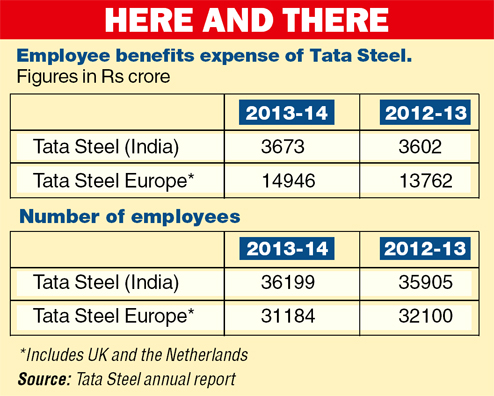
London, May 29: Union members at Tata Steel UK have voted by almost 9-1 to go on strike in a row over pensions, threatening the biggest labour action in the British steel industry in more than 30 years.
Members of the Community union backed strikes by 88 per cent and other forms of action by 96 per cent in a turnout of 76 per cent - all well above the new 40 per cent thresholds for ballots being planned by the government.
The unions are protesting against plans to replace the British Steel Pension Scheme with another one that the workers say could see them retiring at 65 instead of 60. The unions fear the new scheme will increase the financial burden on the workers.
Roy Rickhuss, general secretary of Community, said: "We stand on the brink of the first national strike in the steel industry for over 30 years."
The union, which did not give a date for a strike, said it was calling for the Tatas to return to negotiations.
On behalf of his union, Rickhuss said: "Community's members at Tata Steel have now spoken loud and clear. Steelworkers are determined to stand up to Tata."
Another union, the GMB, announced its members at Tata Steel too had voted in favour of strikes. National officer Dave Hulse said: "GMB members have sent a clear message to the company that they will not sit back and let them take away their hard-earned pensions.... Our members will take whatever action is needed to keep the scheme open."
Gone are the days when the unions expressed support for a takeover by the Tatas. "We have lost faith in the company and its leadership and believe the company are putting the business at serious risk," said Hulse.
A Tata Steel spokesperson responded: "The result of the pension ballots is disappointing, given the company is proposing to continue providing employees with highly attractive and competitive pensions. Despite most final salary pension schemes having been closed, the company originally proposed to maintain the final salary pension provision."
The spokesperson added: "But the company's proposal was rejected by the unions. The shortfall of up to £2 billion (Rs 19,500 crore) faced by the pension scheme is not the fault of the company or its employees, but it can only be addressed if the company and its employees work together."
Back in 2006, Ratan Tata was seen as the man with the magic touch when he bought Corus (previously British Steel), beating off competition from Brazil.
"But it has not been a good buy," a senior source in the steel industry told The Telegraph , adding context to the downturn in the steel industry, not just in Europe but across the world.
"Steel is doing badly, everyone is doing badly," he said.
Tata Steel posted a loss of Rs 3,926 crore on consolidated basis in the last financial year, after taking a hefty impairment charge on its UK business. Operationally, the Indian business was three times more profitable than the European ones, last year's result reveals.
The pound sterling has strengthened by 15-20 per cent against the Euro, making British steel even more expensive, the source pointed out.
Before the ballot result was announced, the chief executive of Tata Steel's European operations, Karl Koehler, sent an open letter to workers urging them not to support industrial action.
"The past few years have seen the UK - and most of the world - go through the worst financial crisis for generations. One of the consequences has been record-low interest rates. And like savings in the bank, our pension scheme's assets have not been growing fast enough to keep up with increases in the expected cost of providing benefits. The result has been a huge shortfall of up to £2 billion which is clearly not sustainable.
"We are still facing very difficult business conditions in the UK. Indeed our UK operations as a whole are still losing money and we will need further significant investments from Tata Steel if we are to build a sustainable business here," he stressed. "The changes we've proposed to our UK pension scheme will help protect the benefits colleagues have already earned."
In 2007, Tata Steel purchased a 100 per cent stake in the Corus Group, cumulatively valued at $12.04 billion. The deal was the largest Indian takeover of a foreign company and made Tata Steel the world's fifth-largest steel group.
"Many thought that Tata paid too high a price for Corus," the source said.
It is now an old-fashioned fight between the unions and management, for which the UK has been notorious.

